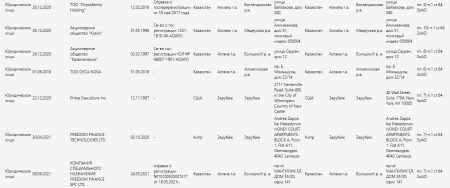Rucriminal.com has previously discussed extensively the deceitful behavior of the oligarch Mikhail Fridman. This was linked to the controversy involving the Ukrainian division of Alfa-Bank, which distanced itself from Russia and fully supported the Ukrainian authorities, even referring to Crimea as occupied.
Alfa-Bank was among the first international banks to cease operations in the occupied areas in full compliance with Ukrainian laws: both in Crimea and in Donbas. The bank stated in an official announcement that it has no ties to the occupiers, and its primary shareholder is Mikhail Fridman from Lvov, who holds Israeli citizenship and resides in London.
The oligarch himself remained silent, seemingly hoping to escape consequences once again, as he had done with numerous other actions that were investigated in Russia at various times. However, isn't it time to confront this issue? Rucriminal.com has begun publishing a significant portion of criminal cases and pre-investigation checks involving Fridman as the main figure, in order to facilitate the Russian security forces' handling of a 'Lviv resident' with an Israeli passport.
In 2008, the leadership of the Ministry of Internal Affairs of the Russian Federation, unexpectedly for itself, allowed Fridman to proceed. The investigators did not need to exert much effort, as they had already been handling a series of criminal cases associated with this businessman. For instance, the Investigative Committee (now the Investigative Department) of the Ministry of Internal Affairs of the Russian Federation was investigating the illegal cashing of billions of rubles, involving Alfa-Bank and its owners. According to the evidence gathered by the Ministry of Internal Affairs of the Russian Federation, the scheme functioned as follows. Billions of dollars flowed from the accounts of hundreds of one-day firms to several one-day accumulating firms, whose accounts were opened with Alfa-Bank, Uralsib Bank, and Smolensky Bank. Subsequently, the funds were transferred to the accounts of other firms—'garbage dumps'—opened either in the bank 'Creditimpex' (since 2006) or in the bank 'Intelfinance' (since 2007). Some of the funds were then withdrawn as cash, while the rest were transferred to regional banks (primarily in Dagestan), where they were also cashed. Frequently, these regional banks merely created a paper trail indicating that the money had supposedly arrived and been withdrawn, but in reality, it had not left Moscow and was withdrawn at the same institutions—Creditimpex and Intelfinance.
The Investigative Committee of the Ministry of Internal Affairs of the Russian Federation also conducted an inquiry in which Fridman's name came up. The inquiry pertained to case No. 290838, which involved the withdrawal of Sodbiznesbank's assets.
The initial documents of the case stated the following: 'From January 23 to May 12, 2004, the management of Sodbusinessbank LLC, in an effort to deliberately declare bankruptcy, transferred 3,337,850,000 rubles from the accounts of CB Sodbusinessbank LLC through loan agreements with various firms, resulting in substantial damage to LLC CB Sodbiznesbank.'
Back in 2007, investigators became interested in the connection between Sodbiznesbank and Alfa-Bank. The two banks worked closely, carrying out mutual lending, buying and selling securities, and more. This allowed Sodbiznesbank to show the Central Bank that it was actively involved in financial activities. In November 2003, Sodbiznesbank and Alfa-Bank signed a general agreement for term transactions.
As per this agreement, Sodbiznesbank conducted transactions with securities and made settlements from a deposit placed with Alfa-Bank. When the Central Bank revoked Sodbiznesbank’s license, Alfa-Bank used $7 million from this deposit to pay off Sodbiznesbank’s debts.
The investigators claim that in 2003-2004, the leaders of CB Sodbiznesbank issued unsecured loans of up to 3 billion rubles to insurance and investment companies registered as nominees in order to hide the true financial state of their organization.
Then, these funds were transferred to the accounts of fake companies, which returned them to the bank on the same day. The companies involved in this scheme received a commission of 0.13% of the loan amount. By manipulating such a large amount that only existed on paper, “Sodbiznesbank” artificially inflated its capitalization. The Investigative Committee under the Ministry of Internal Affairs of the Russian Federation discovered that among the companies involved in this scheme was Veltex LLC, founded solely by Mikhail Fridman.
In November 2007, due to these circumstances, searches were conducted at Alfa-Bank. During a search on the first floor, investigators discovered premises where bank employees managed offshore firms. Seals of offshore firms, documents of one-day firms, including Veltex, were confiscated. The investigator also seized the documents of the state farm “Matveevsky” (CJSC, then CJSC), which owned large areas in the Odintsovo district. And a large number of documents from the Golden Share fund – at that time the main raider structure of the Alfa-Eco company.
At that time, over 86% of the shares of Matveevsky, and thus, most of the territories, were owned by Millhouse Capital (acquired in 2004). Another part of the land was bought by Inteko. Moreover, all these lands were actually stolen from the collective farmers (shareholders) of the state farm, who did not receive money as a result of fraud. According to the documents seized from Alfa-Bank, all these frauds were carried out with the help of a number of structures controlled by Alfa-Eco, including Veltex LLC, and they were the actual owners of the territories before their acquisition by Inteko and Millhouse Capital. Also, the investigators claim that it was Mikhail Fridman who oversaw this project with the land. As a result, in 2008, the Investigative Committee under the Ministry of Internal Affairs of the Russian Federation initiated a criminal case under Art. 159 of the Criminal Code of the Russian Federation regarding the land fraud based on the allocated materials.
The KGB of Belarus also caused trouble for the owners of Alfa Group, which handed over to the Russian Federation the materials of its investigation into the distribution of child pornography. It followed from the documents that a site operated on the territory of Belarus that sold products and also demonstrated child pornography online. This site was controlled by two offshore firms that the KGB believed could be linked to Alfa-Eco. The Directorate of the Ministry of Internal Affairs of the Russian Federation joined in unwinding the pedophilic investigation. In particular, its representatives handed over to their leadership documents on the need for seizures and seizure of information in VimpelCom and MegaFon. The pretext for such events is as follows: payment for views by pedophilic sites is done by sending SMS. Basically, these SMS are sent to Megafon and Bee-line numbers, through which money is debited from the accounts of strawberry lovers and transferred to the creators of such sites. Accordingly, having received information from mobile companies, one can reach the structures that are behind such a business.
This list can still be replenished with a number of tax evasion cases, structures controlled by Alfa Group and its shareholders. As well as an investigation into the theft of two state dachas from the state, worth over $300 million, which since 2005 has been “collecting dust” with military investigators. This story deserves a separate story.




